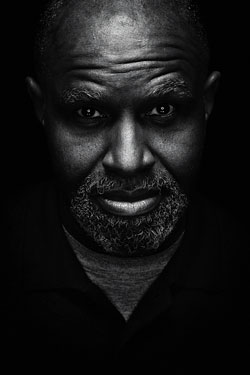I've always been a huge fan of Armond White's (above in the photo by Nigel Perry). Even when he was writing for the long-defunct City Sun, he brought an expansive knowledge of popular culture to bear in his critiques of music and film. For him, there continues to be one standard of excellence. So when he looks at a piece of music or a film, he's compariing it to all the great work that's preceeded it. He's tough, but fair. And this brotha is no joke: He's a former chair of the New York Film Critics Circle and a recipient of the ASCAP-Deems Taylor Award for music criticism. Currently, he's doing weekly film criticism for The New York Press.
Here's part of what he had to say about Michael:
such a fact of life for the past 40 years that the newsmedia’s
disrespect—as in journos’ demeaning “Jacko”—deprives the world of
appreciating the wonder and depth of Jackson’s art. Critics readily
grant hero status to particular artists, but if Bob Dylan, Kurt Cobain,
P.J. Harvey and Eminem are pop’s “geniuses” what word can adequately
describe the world-changing creativity, astounding craft and miraculous
precision of Jackson’s output? His personal issues don’t justify
denying it. Mainstream tastemakers find it difficult to accept the
intellectual, spiritual and aesthetic progress of MJ absorbing Fred
Astaire, Gene Kelly, Billy Eckstein, Sam Cooke, James Brown and Bob
Fosse, continuing their work and matching it in his own style.
There’s
much originality to reflect on: whether the race-defying polemic “Black
or White” or many innovative music-videos like “Scream,” “Bad”
(Scorsese’s best post-’70s film) and the redoubtable “Thriller,” which
many people admire and first showed MJ’s unique flair for combining
popular extravaganza with personal anxiety. Go back to 1971’s “I’ll Be
There” (its essence appears even in MJ’s late work). This early classic
was more than a love song: The youngster’s earnestness conveyed a
cherubic purity in the uncanny lyric, “You and I must make a pact/ We
must bring salvation back.” The religious evocation isn’t cloying; it
recognizes spiritual need in romantic ardor. The innocence of Jackson’s
voice confirms it as natural, basic. Jackson inherited the pop song
tradition like catechism; as a devout, he grew into his own sincere
articulation—as when echoing Billie Holiday in the “Ain’t Nobody’s
Business” refrain of 1988’s “The Way You Make Me Feel,” yet updating
and owning it.
Read more of Armond White's "In MJ's Shadow" here.
Additional link:

